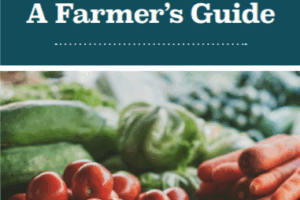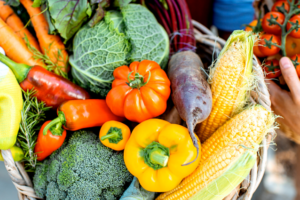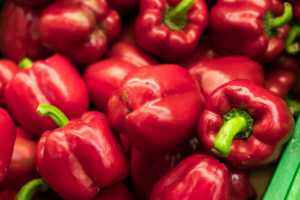
Oliver Gubenko, the founder and CEO of Harvest Drop.
Harvest Drop is a foodhub based in the great state of New Jersey, and it was founded by Oliver Gubenko with a passion for – not just local – but quality food. He found a gap in the local wholesale market for selling produce to a NJ restaurant. Once he was able to hook up the farmers to the chefs, the rest was history…until COVID-19 hit, and his entire business model had to change. Harvest Drop pivoted almost overnight from wholesale to retail, and LFM was there to help them do it. We spoke to Oliver to learn a little more.
LFM: Hi Oliver! Thank you for agreeing to be interviewed, we really appreciate it. For those who don’t know Harvest Drop – give us a little background!
Oliver: Sure! I started Harvest Drop five years ago. I actually have no background in food; I’ve never worked in a restaurant, and I’ve never been on a farm in my life before starting this business. My background was finance. While I was still working full time, I was walking door to door to restaurants on the weekends and meeting chefs. I’d say, “Hey, I want to start this company where I aggregate food from fifteen different farms in New Jersey and sell it to you, is that something you would be into?” And with just that pure curiosity I got my first customers.
The difficult part was finding the farms. It’s easy to walk into a restaurant; you just walk in, ask for the chef, and there he is. I called up every farm that I could find on Google in New Jersey – and obviously nobody knows who I am, and nobody picked up the phone. I was emailing all these people and like…farmers don’t check their emails! They want to be outside, they want to be on the farm. It’s my responsibility to transact the food and list it and let the customers know how much there is and what the price is. So it was difficult at first to find supply, but I was going nuts because I really felt like I could sell it!
I got really lucky. A friend of mine told me about an upcoming NJ Farmers Association meeting, so I got out of work early, I flew to Hackettstown, and there were about 150 farmers in the room. I said, “ I have customers and chefs that are interested in buying your product. If you’re interested in selling to me, I’ll be in the back.” And that night I met our first three producers.
LFM: Were these folks new to wholesale?
Oliver: Yes, in some capacity. One of them was a pretty big farmer down in South Jersey – to this day, I’m buying millions of dollars’ worth of food from him and I’m little to this guy. But the beauty of this is that he still treats me like gold. He stills gets me the best stuff, he still fills our order in full, we’re always the first people to get product.
LFM: How did all that effect your producers?
Oliver: They are benefitting. A number of farms use Harvest Drop as a very significant form of revenue.
But listen – one thing people know about me is that I’m extremely pragmatic. I’m here to put really good food out there. If I can get you a tomato that was picked off the vine today into your kitchen tomorrow, that’s going to be a damn good tomato. If I can get you chicken that was slaughtered today into your kitchen tomorrow, it’s gonna be fresh. That’s why I do what I do.
LFM: Walk us through how Harvest Drop changed due to the COVID-19 shutdowns – how did you manage?
Oliver: When this crisis started, half the farmers in NJ were calling me asking if we were still in business. They were facing losing 40% of their revenue.
By March 16th, I knew we were walking into a bloodbath. The entire industry knew it. At first, I just sat back and watched. I watched sales plummet, I watched chefs scrambling trying to figure out what to do. It was very serious. On Wednesday of that week, I sat down with my entire team and showed them – to the penny – how much money we had in the bank; a basic snapshot of all of our financials. At the time, about $200,000 was sitting in restaurants that weren’t operating. And I told my guys: kiss that money goodbye. I have a small team, it’s just five guys, it’s us against the world. But, at the very least, we had enough cash to survive for 18 months. We were gonna be OK. After we got over that initial shock – once we understood that we could survive – then we could start coming up with ideas. Then we could get creative.
That same week, a few chefs that we knew called us up and wanted to place an order for a single box – for their home. And, you know, sure; I need that order. By then, the answer is hitting us in the face. The few people that know us are asking us for home delivery, and these were our first real direct-to-consumer sales.
LFM: So, you guys had never really operated that way before?
Oliver: I never wanted that kind of business. Originally, I just wanted to sell to chefs.
We spent two days converting everything to retail. That meant calling up all of our producers and saying, “We need retail packs! We need retail mushrooms, we need retail chicken, we need retail salad greens, we need retail everything!”
LFM: Wow – how did your producers react?
Oliver: For some of them, it was easy. Lou (my mushroom guy) already does a lot of retail packaging. So that was super simple.
But for my chicken guy, it was different. I told him, “Listen, we need packages of 2 lb. breast, 2 lb. thigh, single birds, etc. This is what we gotta do to survive. It’s gonna be worth it.” So my man starts hand cryovac-ing each bird, and he worked 48 hours straight to fill that first round of orders. Finally he was able to get some machinery in the door, and he literally dropped 20 grand to support all this new retail business.
LFM: What happened next?
Oliver: That first weekend, I posted about our new offering on Instagram. And it goes absolutely wild.
Do you remember JWoww from that TV show, Jersey Shore? JWoww starts hitting me up on Instagram. And at first I thought she was messing with me. But she was asking me for a box of produce! Side note – I LOVE JWoww; I’m literally her biggest fan now. She’s so cool – so nice and considerate. She’s been ordering for two months now, and she is definitely invited to our company Christmas party. So JWoww runs with our post. And then The Situation [also from Jersey Shore] posts it on his stories. And I swear, then Deanna [also from Jersey Shore] places an order and posts it. That Saturday morning we launched home delivery – and now the whole eastern seaboard knows we’re doing it. So basically, the Jersey Shore crew saved Harvest Drop.
Right now, we’ve finished up our eighth week and we’ve had 22,000 people create customer accounts. We’ve been selling our six truck loads full of food in 29 minutes. I swear, 29 minutes. That first Thursday (our ordering period opens at 8am that day) people were setting their alarms to place their order with us. All of a sudden, its 8am, and you see all the open orders start. It takes 4 or 5 minutes for the first few orders to be submitted. Then, at 8:04 or 8:05, you hear a ding or two [the sound of a customer placing an order]. Then it’s “ding ding ding ding ding ding ding ding” and all of a sudden it’s 8:29 and you’re thinking – we’re done, we can’t move any more food! It was wild.
LFM: What part did the LFM software play in your transition to a retail model?
Oliver: We launched with LFM about three years ago, but only wholesale. And I’ll tell you, it was absolutely critical that we had.
I took on LFM when we were a lot smaller. It was a huge investment. But we still have competitors that are still throwing around PDFs and spreadsheets, and that’s crazy. And honestly, that sucks for them. It sucks for them that they didn’t purchase LFM like, a year or two ago like we did. Because doing all this without LFM [would be] so hard to do. So, step two [after getting our producers ready for retail] was calling LFM. Thankfully we had LFM in place going into this. When all this went down, I was calling Amy for like little tiny tweaks; like, how can I sell out this subperiod, how do I manage this better, etc.
There’s a number of things that LFM was able to customize for us. I think a lot of the options that you see behind the scenes now are because we bugged Amy for it! I remember asking Amy, “Hey, if you’re not a producer [or a] customer, can you log on and see my prices? I need to be able to turn that on and off.” And that was one of the first customizations that LFM did on our behalf. And now it goes out with every license. The level of customization for LFM is key.
LFM: Tell me about that initial decision to purchase the LFM software – what else were you looking at, and what persuaded you to make the jump?
Oliver: Here’s the backstory: Amy cold called me.
As a general business rule, I am open to every conversation. So, I talk to Amy and I tell her what I’m doing and what I’m trying to accomplish. I think that she saw something special in us. I mean, frankly, I’m not the first person running around trying to sell a tomato. But right off the bat, she invested her time and her energy into giving me the best possible solution. And once I saw that – I mean, that was it.
And it feels good when you have smart people like LFM in your corner. It’s not just the ability to customize, it’s the level of care. I know if I’m gonna hop on the phone with Amy, she knows and understands our needs. She’s smart, she’s gonna make suggestions, and she’s always able to help me in a really genuine way. LFM helps us make the software do what we need it to do. Not only do you guys know your own product very intimately – I mean, you built it – but what makes it really great is that LFM knows my business really intimately.
LFM: Was there a particular feature of LFM that was most attractive?
Oliver: In the end – the basis was necessity. And LFM has all the features that we need. I want my customers to have the best online ordering experience, I want my customers not to have to use a PDF, I want my customers to be able to order when I’m sleeping.
I have competitors that are 2-3 times our size that haven’t invested in this stuff and it’s killing them. Some people in my industry are still in the dark ages – it’s all so antiquated! I mean, I work with some farmers that don’t own a cell phone! I work with farmers that don’t use email. It can be a very antiquated industry.
Had I known what this industry is like, I might have been too scared to start this business. But as a customer – of course I would want to order online. I don’t know why these other [businesses] don’t have online ordering, yet, especially with LFM. They’re just not making it happen!



